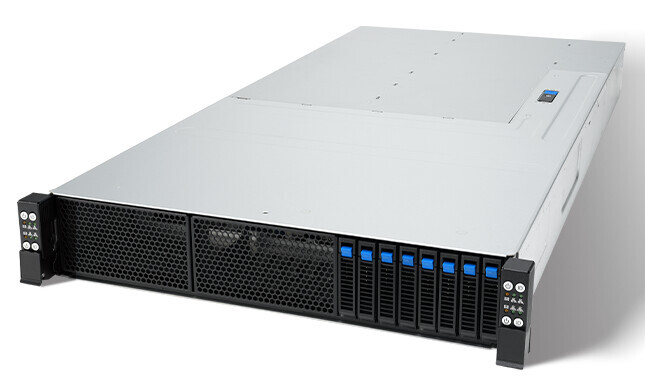ASUS Introduces All-New Intel Xeon 6 Processor Servers
ASUS announced its all-new
line-up of Intel Xeon 6
processor-powered servers, ready to satisfy the
escalating demand for high-performance computing (HPC) solutions.
The new servers include the multi-node ASUS RS920Q-E12, which
supports Intel Xeon 6900 series processors for HPC applications; and the ASUS
RS720Q-E12, RS720-E12 and RS700-E12 server models, embedded with Intel Xeon
6700 series with E-cores, will also support Intel Xeon 6700/6500 series with
P-cores in Q1, 2025, to provide seamless integration and optimization for
modern data centers and diverse IT environments.
These powerful new servers, built on the solid foundation of
trusted and resilient ASUS server design, offer improved scalability, enabling
clients to build customized data centers and scale up their infrastructure to
achieve their highest computing potential - ready to deliver HPC success across
diverse industries and use cases.
ESC I8-E11: Ready for the latest Intel Gaudi 3 AI accelerator
Responding to the surging demand of AI training and
inference, ASUS ESC I8-E11 accommodates eight Intel Gaudi® 3 AI OCP Accelerator Module (OAM) mezzanine cards, and
integrates 24 industry-standard RoCE 200GbE RDMA NICs on every Intel Gaudi 3
accelerator. ESC I8-E11, powered by 5th Gen Intel Xeon processors, features a
modular design that reduces cable usage, shortening assembly time and improving
thermal optimization. It also boasts high power efficiency with redundant 3000W
80 PLUS® PSUs, ensuring reliable and sustainable power supply to
offer exceptional performance, efficiency and versatility for deep-learning
tasks.
RS920Q-E12 and RS720Q-E12: Unleashing data for HPC
ASUS RS920Q-E12 is designed to unleash peak performance and
features the latest Intel Xeon 6900 series processors, plus up to 96 DDR5 RDIMM
6400MT/s and MRDIMM Gen1 8800 MT/s per 2U system. This server is particularly
suited to heavy workloads, ensuring efficient processing and data management.
With advanced liquid-cooling technology to maintain optimal performance and
prevent overheating, RS920Q-E12 offers stability and reliability in demanding
operational environments such as HPC, cloud computing and more.
ASUS also presents RS720Q-E12, another new server with Intel
Xeon 6700 series with E-cores or Intel Xeon 6700/6500 series with P-cores,
engineered for maintaining high resource utilization and reliability. This
server balances resources to optimize I/O throughput, simplifying storage
management and offering great scalability. With optimal space utilization and
efficient performance, RS720Q-E12 offers excellent performance, especially for
the complex semiconductor EDA workloads.
RS720-E12 and RS700-E12: Effortless deployment and exceptional value
ASUS RS720-E12 and RS700-E12 are the latest general-purpose
servers, built with the modular and scalable DC-MHS architecture, providing
seamless integration and optimization for modern data centers and diverse IT
environments. To improve flexibility and security across different data center
platforms, RS720-E12 and RS700-E12 with Intel Xeon 6700 series with E-cores or
Intel Xeon 6700/6500 series with P-cores incorporate DC-SCM, a versatile
baseboard management controller (BMC) module. This innovation shifts common
server management, security and control features from the motherboard to a
practical, modular component.
RS720-E12 is optimized for GPU support, efficiently handling
demanding graphical and computational tasks. With Intel Xeon 6 processors, this
server can manage multiple processes simultaneously, ensuring rapid data
transfer and improving response times. The exclusive ASUS fan-bar design
enhances maintenance convenience, and the optimized I/O throughput minimizes
bottlenecks and improves storage and retrieval efficiency.
For effortless deployment and exceptional value, RS700-E12
provides high-speed data access and transfer rates with all-NVMe storage,
multi-core processors, and large memory capacity. This server accommodates
extensive data demands while maintaining swift access times, ensuring efficient
multitasking, and processing of complex workloads.































Leave A Comment